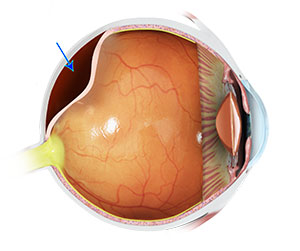
What is Posterior Vitreous Detachment?
Posterior vitreous detachment (PVD) is an eye condition that usually affects both the eyes and is more common during adulthood. It occurs when the vitreous gel that fills your eye, separates from the retina: the light-sensing nerve layer at the back of your eye.
What are the Causes of Posterior Vitreous Detachment?
Posterior vitreous detachment may occur due to the following reasons:
- Aging – usually after 60 years and above
- Degenerative wear and tear
As you age, the vitreous gel shrinks and becomes more watery, and can easily detach from the retina.
What Increases the Risks of Posterior Vitreous Detachment?
The risk factors for posterior vitreous detachment include:
- Diabetes
- Cataract
- Nearsightedness
- Eye surgery
- Injury to the eye
What are the Symptoms of Posterior Vitreous Detachment?
The common symptoms of posterior vitreous detachment include:
- Small flashes of light lasting a few seconds or minutes
- Floating spots in your field of vision that may resemble cobwebs or tiny dots
How is Posterior Vitreous Detachment Diagnosed?
Your ophthalmologist/eye specialist will perform a comprehensive eye exam which involves putting special drops in your eyes. These drops widen your pupils and allows the doctor to view the back of your eye clearly.
You may also be required to undergo an ocular ultrasound or additional tests like optical coherence tomography (OCT). In an ocular ultrasound, high-frequency sound waves are used, while in an OCT light waves are used, that are focused on the eye to generate images of the eye’s internal structure. This helps differentiate posterior vitreous detachment from retinal detachment.
What are the Treatment Options for Posterior Vitreous Detachment?
Usually, symptoms of posterior vitreous detachment subside naturally within a few months. However, if floaters or light flashes become more intense and frequent, they can be treated through laser treatment. If you have been diagnosed with a retinal tear, then you will be required to undergo eye surgery.
Related Topics
- Retinal Detachment
- Retinal Tear
- Diabetic Retinopathy
- Age-Related Macular Degeneration
- Retinal Vascular Diseases
- Retinal Artery Occlusion
- Retinal Vein Occlusion
- Retinal Hemorrhage
- Vitreous Hemorrhage of any Etiology
- Central Serous Retinopathy
- Posterior Vitreous Detachment
- Vitreomacular Traction Syndrome
- Epiretinal Membrane
- Macular Edema
- Macular Hole
- Retinoschisis
- Ocular Ischemic Syndrome
- Cystoid Macular edema
- Color Blindness
- Nyctalopia/Night Blindness
- Cone Dystrophy
- Choroideremia
- Retinopathy of Prematurity
- Uveitis & Ocular Inflammation
- Retinoblastoma

